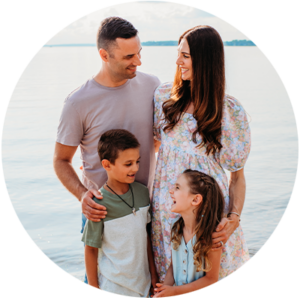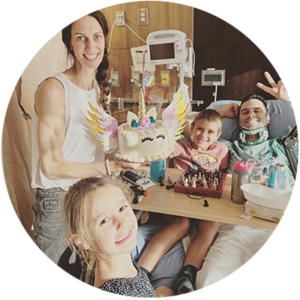Change is hard. The changing of the seasons, an ending relationship, losing your job, or as my husband recently experienced, an accident that immediately and irreparably changed his body.
 Greg, my husband of 10 years, broke his neck in a mountain biking accident resulting in a spinal cord injury. This extremely active human, whom I affectionately nicknamed “captain leisure,” was now classified as a C8 quadriplegic.
Greg, my husband of 10 years, broke his neck in a mountain biking accident resulting in a spinal cord injury. This extremely active human, whom I affectionately nicknamed “captain leisure,” was now classified as a C8 quadriplegic.
I am Greg’s busy working wife and the mother of our two young children. Until now my relationship with change has evolved through moving cities, wedding planning, setting up a nursery, and navigating new jobs. Those changes were incremental and came with well-trodden paths I could follow from those who walked before me and could guide me from their vantage point on the other side.
But confronting the sudden change of having a partner with a spinal cord injury has presented challenges I was unprepared to cope with on my own.
I don’t expect you have gone through the same thing, but I bet most of you have experienced a change that so alters your trajectory it leaves you feeling dangerously unmoored and adrift, the way I do. The following is a compellation of what I found to be the most helpful techniques for coping with this unexpected adversity:
I feel my feelings. Make space for them. Name them. “I’m feeling sad,” or “I’m feeling angry.” Dr. Dan Siegal, Professor of Psychiatry at the UCLA School of Medicine helps me “name it to tame it.” I breathe through the feelings of loss, sadness, anger, or grief until the feelings eventually dissipate or go away on their own. I don’t judge my feelings or at least try not to. I don’t classify them, but just notice them and allow them to be present until they take up less space. There are many times I say, “I’m feeling sad today.” If people know how I’m feeling they award more patience and empathy.
 I feel my feelings. Make space for them. Name them. “I’m feeling sad,” or “I’m feeling angry.”
I feel my feelings. Make space for them. Name them. “I’m feeling sad,” or “I’m feeling angry.”
I take time to grieve the change. I catch myself grieving the idea of what life would have looked like if Greg hadn’t been injured. It is difficult to grieve these ideas because they were never “real” or tangible. It almost feels like an indulgence, but I remind myself (and you) it is not. Sitting in the feelings of loss, sadness, despair, hopelessness, the “why me?” thoughts is a part of the change process that can’t be bypassed. I trust that when I’m ready these feelings will lessen and I can focus my mind on the present and the future. What will life look like now? How will I find joy in the world? How will I find purpose? I have learned about “post traumatic growth” (PTG), an experience developed by psychologists Drs. Richard Tedeschi, and Lawrence Calhoun who found that people who endure psychological struggle within change or adversity can often see positive growth afterwards. For me I know that I have grown as a human. I am definitely a more understanding person when it comes to accessibility needs and the psychological needs of others.
 I remember the 3 P’s. I read this idea in, Option B: Facing Adversity, Building Resilience and Finding Joy by former Facebook CFO Sheryl Sandberg and psychologist Adam Grant. The 3 P’s are: personalization, permanence, and pervasiveness. This principal tells me that when going through change or experiencing grief, it is important to not personalize it because the change is not a representation of what kind of person I am. Change is just something that happens. The feelings brought on by this change are not permanent. I won’t always feel like this. The change is not pervasive. While this change happened and is perhaps having a negative impact on one part of my life, other parts can be good. With Greg’s accident and paralysis I am continuously reminding myself it isn’t personal. This didn’t happen because we are bad people. Accidents are tragic events that occur without explanation. I remind myself the sadness and grief I’m feeling over the loss of his mobility and the life we planned is not permanent. I remember that his quadriplegia is not pervasive we can still live a full and happy life doing many of the things we enjoy. I still find fulfillment at work and as a mother. I still have a strong family and robust friendships.
I remember the 3 P’s. I read this idea in, Option B: Facing Adversity, Building Resilience and Finding Joy by former Facebook CFO Sheryl Sandberg and psychologist Adam Grant. The 3 P’s are: personalization, permanence, and pervasiveness. This principal tells me that when going through change or experiencing grief, it is important to not personalize it because the change is not a representation of what kind of person I am. Change is just something that happens. The feelings brought on by this change are not permanent. I won’t always feel like this. The change is not pervasive. While this change happened and is perhaps having a negative impact on one part of my life, other parts can be good. With Greg’s accident and paralysis I am continuously reminding myself it isn’t personal. This didn’t happen because we are bad people. Accidents are tragic events that occur without explanation. I remind myself the sadness and grief I’m feeling over the loss of his mobility and the life we planned is not permanent. I remember that his quadriplegia is not pervasive we can still live a full and happy life doing many of the things we enjoy. I still find fulfillment at work and as a mother. I still have a strong family and robust friendships.
I arm myself against fear. One helpful exercise is to write whatever is scaring me at the top of a piece of paper and then proceed to write down all the reasons I know why this fear is not true. After my husband’s accident, I wrote down my fear of not being able to continue to be active together as a family. I then proceeded to write down all the reasons this was not true. I wrote down examples of how we would still be able to be active: he will have a trail compatible wheelchair, he will register for the adaptive ski program at Edelweiss Ski Resort, he is coaching my son’s competitive hockey team.
I remember myself. This huge change means it is more necessary than ever to take care of me. Put on my own oxygen mask before anyone else’s. This kind of seismic, earth shaking change requires more than wine and bubble baths. I am trying to prioritize getting adequate sleep, eating balanced healthy meals, checking in with my support system, exercising my body, spending time in nature, and taking breaks to focus on mental health.
While Greg’s mountain biking accident is a very specific adjustment, change is universal, we all experience it. The good news is the tools to navigate these changes are accessible to all of us no matter the circumstances. Please remember to be kind to yourselves and others. We never know what people are struggling with.
Brittany Antoine is a writer, wife, mother, and medical device sales representative.






